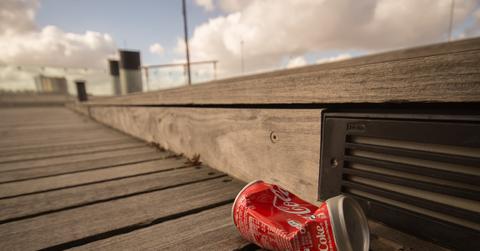This App Turns Cleaning The Planet Into A Mobile Game
Litterati is a new app for mobile devices that makes it easy for communities to document their collection of trash. It's led to funding from supporters and the US government to expand the app, creating more collaboration and further data analysis of our pollution.
Updated May 26 2019, 7:44 p.m. ET
How many times have we walked along city sidewalks and seen pieces of trash floating across our feet? With no immediate incentive to dispose of it properly, many of us will let it go instead of getting our hands dirty and going off our path to throw it away. A new phone app hopes to buck that trend, and it’s received a lot support from crowdfunding and the United States government.
The idea for Litterati, an app for Android and iOS devices, came to 46-year-old Jeff Kirschner when his daughter spotted discarded cat litter in a creek. It reminded him of a time when instructors at a summer camp wanted all the kids to pick up just five pieces of trash. With a large number of kids making a small effort to pick up the park, it would create a much cleaner place.
Expanding that philosophy around the world, over one million pieces of trash have been collected and documented through the Litterati app. Users take photos of litter they’ve picked up, and it’s led to a tremendous amount of information being gathered in the process. With a base of around 60,000 users, they post an average of 10,000 pieces of trash picked up per week.
"This is a massive problem," Kirschner told Business Insider. "It impacts the economy, the environment, it degrades community pride, it decreases property value, it kills wildlife, and now with the plastic pollution in the ocean situation, it is literally poisoning our food system."
Differences have been made at various communities and schools with the app. For example, the large amount of cigarette butts littered in San Francisco created an increased sales tax that led to $4 million being generated to clean up the city. Also in the state of California, a school found out that most of their surrounding litter was plastic straws from their cafeteria, which led to the school getting rid of the straws altogether.
With a lot of potential in this crowdfunded data, Kirschner and his small team has received funding to expand the app. They launched a Kickstarter campaign late last year that reached its $50,000 goal with nearly 600 backers. Recently, they were handed a $225,000 grant from the National Science Foundation, who offers funding for research and educational projects.
What will this funding be used for? There are three new features that the Litterati team will be focusing on. Findings from schools, companies, and others will have more collaboration to make a better community overall. In the same vein, there will be maps to pinpoint various levels of litter down to the specific neighborhood. Finally, there will be plenty of data analysis for people to use, such as categorizing litter they pick up or optimizing trash can placement.
Data analysis could be vital for corporations to monitor how much they impact the environment. This could supplement LLamasoft, supply chain software that has the ability to pinpoint where a company is releasing the most carbon dioxide emissions. In a similar way, Litterati could detail what product is creating the most litter in our communities.
